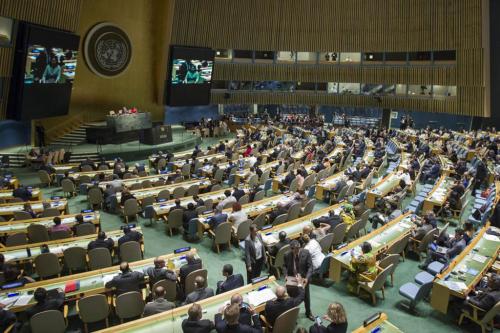Sweden, Bolivia, Ethiopia and Kazakhstan elected to Security Council
The 193 members of the United Nations General Assembly elected Sweden, Bolivia, Ethiopia and Kazakhstan to serve on the world body’s Security Council for a period of two years on June 28, starting from 1 January 2017.

Wide view of the General Assembly Hall while ballots are being collected for the election of new non-permanent members of the Security Council for two-year terms starting on 1 January 2017.
After rounds of voting at UN Headquarters in New York on Tuesday, only one non-permanent Council seat remains to be filled. Italy and the Netherlands had been vying for the remaining seat, but the voting yielded no clear winner. The two countries then suggested sharing the two-year term, each with a one-year period, with a decision on this proposal postponed to Wednesday.
Under the UN Charter, the Security Council has the primary responsibility for international peace and security, with all UN Member States required to comply with Council decisions. The Council’s 10 non-permanent seats are allocated according to a rotation pattern set by the Assembly in 1963, to ensure a proportionate representation over time from the different parts of the world: five from African and Asian States; one from Eastern European States; two from Latin American States; and two from Western European and Other States.
At the election, the General Assembly members voted by secret ballot for five seats divided by geographical grouping – three from Africa and the Asia-Pacific region, one from Eastern Europe, and one from Latin America and the Caribbean.
Bolivia and Ethiopia were chosen by their regional groups and had no competitors. Kazakhstan won the seat reserved for Asia Pacific against Thailand, while Italy, the Netherlands and Sweden had competed for two seats for Western Europe.
The newly-elected countries will replace Spain, Malaysia, New Zealand, Angola and Venezuela.
The Security Council has 15 members, including five permanent. The five permanent members, each with the power of veto, are China, France, Russia, the United Kingdom and the United States. Other current non-permanent members are Japan, Egypt, Senegal, Ukraine and Uruguay.
The Security Council is also responsible for determining the existence of a threat against peace and to respond to an act of aggression. It is also responsible for finding peaceful means to settle a conflict or a dispute between States. In some cases, the Council can resort to sanctions or even authorize the use of force to maintain or restore international peace and security.
The Security Council also recommends to the General Assembly the appointment of the Secretary General and the admission of new Members to the United Nations.
Source: United Nations
- 276 reads
Human Rights
Fostering a More Humane World: The 28th Eurasian Economic Summi

Conscience, Hope, and Action: Keys to Global Peace and Sustainability

Ringing FOWPAL’s Peace Bell for the World:Nobel Peace Prize Laureates’ Visions and Actions

Protecting the World’s Cultural Diversity for a Sustainable Future

Puppet Show I International Friendship Day 2020

